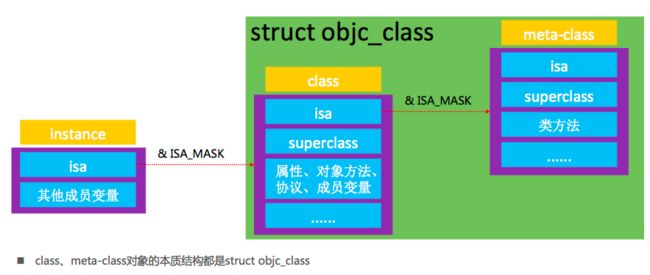2018年08月29日
- 在3.8.2里补上
objc_object结构的解析,说明它与objc_class在成员变量结构上是相似的
2018年08月26日
- 添加参考使用源码版本说明
注:分析参考 MJ底层原理班 内容,本着自己学习原则记录
本文使用的源码为objc4-723
1 Category 是什么
1.1 语言特性
- category是Objective-C 2.0之后添加的语言特性
1.2 就是对象
-
从文件类型上观察,与普通类一样,具有.h 和.m文件
从文件内容上看,与普通类一样,具有声明和实现编码格式
- Person
/// Person
@interface Person : NSObject
@end
/// Person.m
@implementation Person
@end
- Person+Test1
/// Person+Test1.h
@interface Person (Test1)
@end
/// Person+Test1.m
@implementation Person (Test1)
@end
- 将Person+Test1.m转为C++代码
执行命令
xcrun -sdk iphoneos clang -arch arm64 -rewrite-objc Person+Test1.m,然后获得Person+Test1.cpp文件-
通过
struct _category_t类型的结构体来表示 Person+Test1
-
struct _category_t包含的成员变量有
1)、类的名字(name)
2)、类(cls)
3)、category中所有给类添加的实例方法的列表(instance_methods)
4)、category中所有添加的类方法的列表(class_methods)
5)、category实现的所有协议的列表(protocols)
6)、category中添加的所有属性(properties)
结合之前对NSObject的本质探究的描述,它们都是通过结构体形式来表现,所以可以说明Category本质上也是一个对象
1.3 应用场景
- category的主要作用是为已经存在的类添加方法。
除此之外,apple还推荐了category的另外两个使用场景
- 可以把类的实现分开在几个不同的文件里面。这样做有几个显而易见的好处,
a)可以减少单个文件的体积
b)可以把不同的功能组织到不同的category里
c)可以由多个开发者共同完成一个类
d)可以按需加载想要的category 等等。 - 声明私有方法
- 不过除了apple推荐的使用场景,广大开发者脑洞大开,还衍生出了category的其他几个使用场景:
- 模拟多继承
- 把framework的私有方法公开
REF
- 深入理解Objective-C:Category
2 Category 在 runtime 源码中的 struct _category_t 实现
-
基本与通过命令行获取的类型描述差不多
3 程序运行时,runtime 对 Category 的处理逻辑探究
runtime 会将Category 的
instanceMethods、calssMethods和protocols等信息合并到class-object和meta-class中
在 runtime 源码中查找初始化类时对 Category 的处理逻辑
3.1 通过runtime源码,找到文件 objc-os.mm 文件
3.2 在里面找到void _objc_init(void)方法,它是OC 的 runtime 启动初始化方法
3.3 搜索map_images方法,可获得map_images、load_images、unmap_image等方法实现
3.4 对比发现
load_images方法与+load 的实现相关
unmap_image方法则与map_images相反
所以先继续探究map_images函数的实现,其中调用了函数map_images_nolock
3.5 map_images_nolock内调用了_read_images函数,且其中一个参数是 totalClasses也就是处理所有类对象相关动作函数(省略了其他源码)
void
map_images_nolock(unsigned mhCount, const char * const mhPaths[],
const struct mach_header * const mhdrs[])
{
// ... 其他行为代码
if (hCount > 0) {
_read_images(hList, hCount, totalClasses, unoptimizedTotalClasses);
}
// ... 其他行为代码
3.6 _read_images中对 Category 处理的逻辑部分(省略了其他源码)
/***********************************************************************
* _read_images
* Perform initial processing of the headers in the linked
* list beginning with headerList.
*
* Called by: map_images_nolock
*
* Locking: runtimeLock acquired by map_images
**********************************************************************/
void _read_images(header_info **hList, uint32_t hCount, int totalClasses, int unoptimizedTotalClasses)
{
/// ... 其他行为代码
size_t count;
// Discover categories.
for (EACH_HEADER) {
category_t **catlist =
_getObjc2CategoryList(hi, &count);
bool hasClassProperties = hi->info()->hasCategoryClassProperties();
for (i = 0; i < count; i++) { // 遍历该类的所有分类
category_t *cat = catlist[i]; // 取出分类
Class cls = remapClass(cat->cls); // 获取该分类对应的类
if (!cls) {
// Category's target class is missing (probably weak-linked).
// Disavow any knowledge of this category.
catlist[i] = nil;
if (PrintConnecting) {
_objc_inform("CLASS: IGNORING category \?\?\?(%s) %p with "
"missing weak-linked target class",
cat->name, cat);
}
continue;
}
// Process this category.
// First, register the category with its target class.
// Then, rebuild the class's method lists (etc) if
// the class is realized.
bool classExists = NO;
/// 处理类对象
if (cat->instanceMethods || cat->protocols
|| cat->instanceProperties)
{ // 该分类的结构体中实例方法或协议或实例属性中,其中一个成员变量有值即进入对应的 rebuild 环节
addUnattachedCategoryForClass(cat, cls, hi);
if (cls->isRealized()) {
remethodizeClass(cls); /// 重点,重建类对象的方法列表
classExists = YES;
}
if (PrintConnecting) {
_objc_inform("CLASS: found category -%s(%s) %s",
cls->nameForLogging(), cat->name,
classExists ? "on existing class" : "");
}
}
/// 处理元类对象
if (cat->classMethods || cat->protocols
|| (hasClassProperties && cat->_classProperties))
{
addUnattachedCategoryForClass(cat, cls->ISA(), hi);
if (cls->ISA()->isRealized()) {
remethodizeClass(cls->ISA()); /// 重点,重建元类对象的方法列表
}
if (PrintConnecting) {
_objc_inform("CLASS: found category +%s(%s)",
cls->nameForLogging(), cat->name);
}
}
}
}
ts.log("IMAGE TIMES: discover categories");
// Category discovery MUST BE LAST to avoid potential races
// when other threads call the new category code before
// this thread finishes its fixups.
/// ... 其他行为代码
3.7 static void remethodizeClass(Class cls)函数实现,其中调用函数attachCategories
3.8 attachCategories函数实现
注意其中的 while 循环,这是一个倒序组装逻辑,通过 i-- 倒序遍历过程,在组合 mlists 时,会将最后编译的分类方法列表信息添加至 mlists 数组的最前面
3.8.1 最后会将从分类中收集的对象方法列表(mlists) 、属性信息列表(proplists)、协议信息列表(protolists)拼接到类的 rw 结构中的对应列表内。
3.8.2 auto rw = cls->data();的理解:
实例对象、类对象、元类对象的基本内存结构如下,其中类对象和元类对象的本质结构都是struct objc_class类型 而 instance 对象的本质结构是 struct objc_object
struct objc_class类型内存结构如下:(省略了其他源码)
struct objc_class : objc_object {
// Class ISA;
Class superclass;
cache_t cache; // formerly cache pointer and vtable
class_data_bits_t bits; // class_rw_t * plus custom rr/alloc flags
class_rw_t *data() {
return bits.data();
}
/// ... 其他行为代码
}
objc_object类型内存结构如下:(省略了其他源码)
struct objc_object {
private:
isa_t isa;
public:
// ISA() assumes this is NOT a tagged pointer object
Class ISA();
// getIsa() allows this to be a tagged pointer object
Class getIsa();
/// ... 其他行为代码
}
而在objc_object结构中的 isa_t isa;, 这个 isa_t 结构如下:它内部包含一个 Class cls 成员变量,而 Class 定义是 typedef struct objc_class *Class;从此也就是说明objc_object具有上述objc_class的内存结构
union isa_t
{
isa_t() { }
isa_t(uintptr_t value) : bits(value) { }
Class cls;
uintptr_t bits;
/// ... 其他行为代码
}
所以 auto rw = cls->data(); 获取得到的 rw 类型即使struct class_rw_t 类型,其结构如下(省略了其他源码),也说明了 rw->methods、rw->properties、rw->protocols等操作原理。
struct class_rw_t {
// Be warned that Symbolication knows the layout of this structure.
uint32_t flags;
uint32_t version;
const class_ro_t *ro;
method_array_t methods;
property_array_t properties;
protocol_array_t protocols;
Class firstSubclass;
Class nextSiblingClass;
char *demangledName;
/// ... 其他行为代码
}
基本关系如下图所示:
attachLists()(拼接从分类中获取的实例方法、属性、协议等列表)的实现方式如下:
void attachLists(List* const * addedLists, uint32_t addedCount) {
if (addedCount == 0) return;
if (hasArray()) {
// many lists -> many lists
uint32_t oldCount = array()->count;
uint32_t newCount = oldCount + addedCount;
/// 按照新添加的列表个数给类方法列表数组扩容
setArray((array_t *)realloc(array(), array_t::byteSize(newCount)));
array()->count = newCount;
/// 将类的原方法信息移动到扩容数组的最后面
memmove(array()->lists + addedCount,
array()->lists,
oldCount * sizeof(array()->lists[0]));
/// 将从多个分类中组装好的列表数组元素复制到扩容数组前面
memcpy(array()->lists,
addedLists,
addedCount * sizeof(array()->lists[0]));
}
else if (!list && addedCount == 1) {
// 0 lists -> 1 list
list = addedLists[0];
}
else {
// 1 list -> many lists
List* oldList = list;
uint32_t oldCount = oldList ? 1 : 0;
uint32_t newCount = oldCount + addedCount;
setArray((array_t *)malloc(array_t::byteSize(newCount)));
array()->count = newCount;
if (oldList) array()->lists[addedCount] = oldList;
memcpy(array()->lists, addedLists,
addedCount * sizeof(array()->lists[0]));
}
}
3.9 memmove 和 memcpy 的使用区别
* 先使用 memmove 对原类的方法列表元素移动到扩容数组最后面,而不用 memcpy 的目的是保证准确性,如果使用 memcpy 的话,一旦dst 和 src 出现重叠情况则无法保证准确性
* 后面使用 memcpy 则无需考虑重叠问题,因为该操作是两个列表对象的复制操作,没有重叠风险。
4 runtime 处理 Category 后的结论
- 分类中的方法、属性、协议等信息会通过 runtime 机制,被附加到对应类的类对象和元类对象结构中。
- 因为
倒序组装所有分类列表和向前附加的动作(将分类的方法等插入到类对象列表前面),这就会导致:- 分类与类,优先调用分类的方法
- 分类与分类,优先调用后编译的分类方法
5 相关题
5.1 Category的使用场合是什么?
- 参考第1点
5.2 Category的实现原理
- Category 编译之后的底层结构是 struct category_t,里面存储着分类的instanceMethods、classMethods、instanceProperties、protocols信息等
- 在程序运行的时候,runtime 会将 Category 的数据,合并到类(类对象、元类对象)信息中
4.3 Category和Class Extension的区别是什么?
- Category 具有@implementation 而 Class Extension 没有
- Class Extension 基本目的是私有化(一般写在.m文件中的)属性、方法、成员变量、协议等信息
- 必须有一个类的源码才能为一个类添加Extension,所以一般情况下你无法为系统的类比如NSString添加extension(因为Extension只能写在类的.h或.m中),但是可以通过写在 Category 中间接导入
- Class Extension在编译的时候,它的数据就已经包含在类信息中
- Category 是在运行时,才会将数据合并到类信息中
文/Jacob_LJ(作者)
PS:如非特别说明,所有文章均为原创作品,著作权归作者所有,转载需联系作者获得授权,并注明出处,所有打赏均归本人所有!











